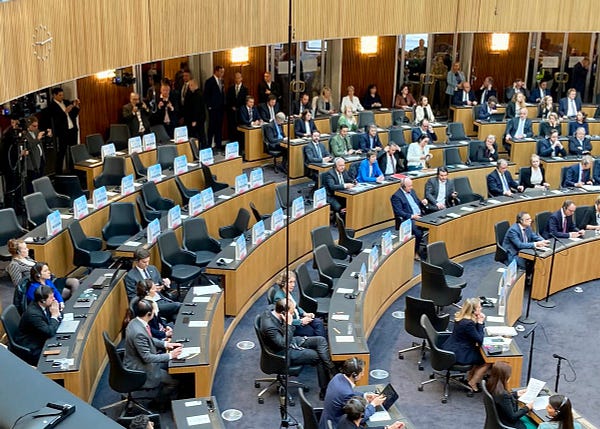A House Divided
The tone of Austrian politics is as coarse now as it was during the 1920s, Salzburg's governor warned over the weekend

Servus!
This week, my attention was drawn towards an interview published in the Standard with Salzburg governor Wilfried Haslauer (People’s Party, ÖVP) who is up for re-election at the end of April. First, because Haslauer rejected aspects of Lower Austria governor Johanna Mikl-Leitner’s coalition deal with the far-right Freedom Party (FPÖ), namely a plan to use state funds to compensate those who violated COVID-19 rules and regulations. Second, because he bemoaned the “coarsening” of political discourse in Austria, whose tone he compared to how things were in the 1920s.
Last month, Austria marked 90 years since then-chancellor Engelbert Dollfuss shut down the country’s parliament and moved to rule by-decree. It was the beginning of the end for multi-party democracy in Austria as the country morphed into an Austrofascist autocracy. The events of March 4, 1933 were the death knell for the First Republic which, established after the First World War, was defined by an immature, inhospitable, and combustible political culture and deep, insurmountable divisions between Austria’s socialist and Catholic political camps.
The Second Republic’s founding in the closing months of the Second World War was shaped by the Austrian political class’s collective experience of the First Republic, Austrofascism, and Nazism—and lest we forget that March also marked 85 years since the Anschluss, Austria’s assumption into the Greater German Reich. Where there was discord, the ÖVP, Social Democratic Party (SPÖ), and Communist Party (KPÖ) sought to bring harmony. Much of Austria’s political hardware including the party politicization of state institutions and the ‘social partnership’ between politics, labor, and industry is the product of that postwar vision.
It goes without saying that Austria is far removed from the 1920s, a period in its history when the precursors to the modern SPÖ and ÖVP were operating paramilitary organizations, resulting in violent clashes between socialists and Catholics and, ultimately, civil war. That this is the case is precisely because of the country’s aforementioned institutional make-up which means all roads lead to forms of consensus-based decision-making. I do think, however, that Haslauer is right that the political atmosphere in Austria is particularly hot and sticky right now, and indeed, on the surface another schism is opening up in federal politics.
Haslauer’s party, the ÖVP, shares a lot of the blame for this, conservatives having spent a large part of the past 20 to 30 years chasing FPÖ voters, aligning themselves with the far-right on immigration and going into coalition with them nationally on three occasions since 2000. As I warned two weeks ago, another ÖVP-FPÖ coalition at the federal level cannot be ruled out. As a consequence, all the talk in the SPÖ right now vis-à-vis its current leadership contest is about keeping the ÖVP out of power and which candidate would be best placed to establish a so-called traffic light coalition with the Greens and liberal NEOS.
At a subterranean level, however, the picture is more mixed. The SPÖ has just gone back into coalition with the ÖVP in Carinthia and the two parties also formed a pact in Tyrol in October last year. Christopher Drexler (ÖVP) governs with the SPÖ in Styria and expressed his wish for a similar arrangement at the federal level in a recent interview with the Kurier. Haslauer currently governs with the Greens and NEOS in Salzburg, though after April he will be looking for a new partner. Will it be the FPÖ or SPÖ? Were it the latter, it would show that in spite of the brouhaha and ballyhoo in the capital, out in the states the grand coalition is far from dead.
Bis bald!
Thank you for subscribing to the Vienna Briefing. If you know someone who might also be interested in receiving this newsletter, consider sharing it with them today.
The Vienna Briefing is a free newsletter. If you enjoy and would like to support my work, think about sending me a tip via PayPal. Thank you to all those who have contributed.
FPÖ Turns Its Back On Ukraine
FPÖ parliamentarians walked out of an address by Ukrainian president Volodymyr Zelenskyy to the Austrian parliament on Thursday. Only 18 of the SPÖ’s 40 MPs attended the speech conducted via video link in which Zelenskyy thanked Austria for its humanitarian and financial support for Ukraine.


Newspaper Offices Raided
Anti-corruption authorities searched the offices of the daily freesheet Heute last week. The search was linked to an ongoing investigation into whether the finance ministry previously used government advertising as a trade-off for friendly coverage of then-foreign minister Sebastian Kurz.
Base Backs Babler
Traiskirchen mayor Andreas Babler has more than 2,000 nominations from party members as part of his bid for the SPÖ leadership. Incumbent Pamela Rendi-Wagner presented 100 nominations from prominent women in the SPÖ to party officials, while Burgenland governor Hans Peter Doskosil has attracted 440 nominations.
Happy Easter; happy Passover! The Vienna Briefing will return on April 19.


